Protecting patient data while using AI in healthcare is critical. Here are seven HIPAA-compliant AI tools that help healthcare organizations securely leverage AI for tasks like documentation, analytics, and decision-making:
- Hathr.AI: Affordable ($45/month) NLP platform with AWS GovCloud hosting for secure data processing.
- Google Cloud AI for Healthcare: Advanced AI tools for large-scale data analytics with FHIR interoperability.
- Suki AI: Voice-driven clinical documentation assistant with real-time transcription and coding support.
- Amazon Comprehend Medical: Extracts structured data from unstructured medical text, like clinical notes.
- Microsoft Azure Healthcare APIs: FHIR-based platform for healthcare data integration and analytics.
- IBM Watson Health: AI-powered clinical decision support and predictive analytics with HIPAA-ready configurations.
- DeepScribe: Speech-to-text tool for automated clinical documentation integrated with EHR systems.
Quick Comparison
| Tool | Primary Use | HIPAA Compliance Features | Pricing | Best For |
|---|---|---|---|---|
| Hathr.AI | NLP, document analysis | AWS GovCloud, encryption | $45/month | Small teams handling PHI |
| Google Cloud AI | Analytics, imaging | BAA, encrypted data storage | Pay-per-use | Large-scale data workflows |
| Suki AI | Voice-driven documentation | Secure cloud, real-time encryption | Subscription-based | Clinician documentation |
| Amazon Comprehend | Medical text analysis | AWS security, encryption | Pay-per-request | Text processing |
| Microsoft Azure | FHIR data integration | Compliance monitoring, encryption | Usage-based pricing | Healthcare system integration |
| IBM Watson Health | Clinical decision support | Audit controls, encryption | Enterprise licensing | Predictive analytics |
| DeepScribe | Speech-to-text documentation | AES-256 encryption, SSO | Subscription tiers | EHR-integrated documentation |
These tools offer secure, efficient solutions for healthcare organizations to adopt AI while staying HIPAA-compliant. Choose based on your needs, such as documentation, analytics, or interoperability.
Healthcare, Defense and AI with Sam Hart
1. Hathr.AI
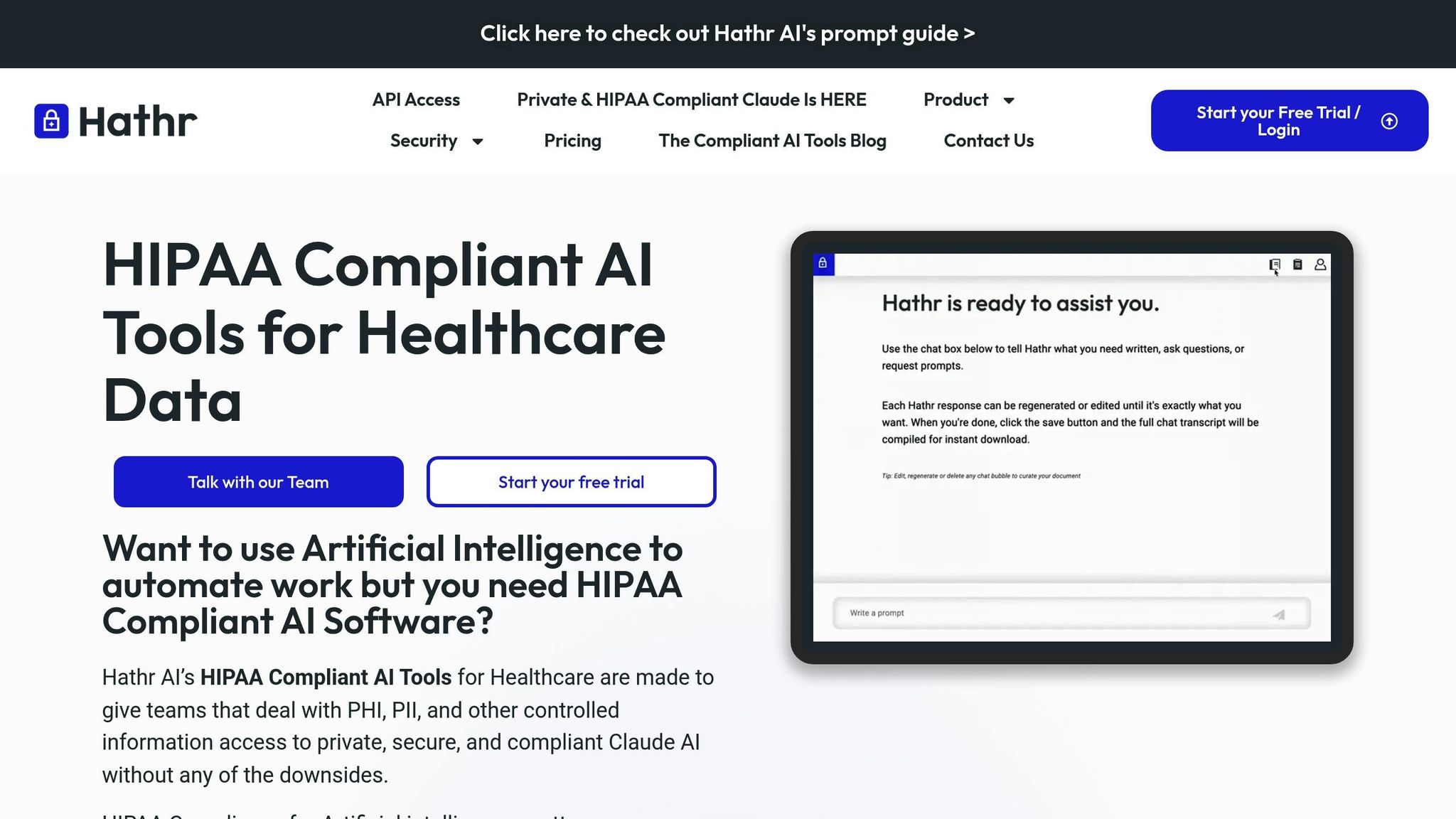
Hathr.AI is an AI-powered platform designed for healthcare, offering enterprise-level security while adhering to HIPAA standards. Built on Anthropic's Claude, it ensures patient data remains protected while optimizing healthcare workflows.
HIPAA Compliance Mechanisms
Hathr.AI takes HIPAA compliance seriously, employing a multi-layered approach to safeguard sensitive healthcare data. The platform operates within AWS GovCloud's FedRAMP High environment, meeting strict federal government standards for data protection.
"Hathr AI is unique because it isolates and protects each account's data, providing security in depth. Hathr AI keeps user data in a standalone environment and data is stored in our unique, standalone, AWS GovCloud environment safe for HIPAA Compliance and Federal Government Data Protection Requirements."
Healthcare organizations can sign Business Associate Agreements (BAAs) with Hathr.AI, ensuring all legal and regulatory requirements for handling Protected Health Information (PHI) are met. These measures are bolstered by advanced encryption and strict data isolation practices.
Data Security and Encryption Features
Hathr.AI prioritizes data security with TLS 1.3 encryption for data in transit and FIPS 140-2 compliant encryption for data at rest. Each organization's data is isolated, ensuring it remains separate from other clients. The platform avoids retaining or reusing sensitive information beyond its intended purpose and does not use patient records to train AI models without explicit consent. Access to medical records is tightly controlled, with only authorized personnel permitted to initiate analyses. Additionally, audit logs provide transparency by tracking all access and actions.
Core Healthcare Functionality
Hathr.AI streamlines healthcare operations by automating tasks like patient note summarization, pre-authorization drafting, and insurance claim submissions. These features free up healthcare teams to focus on patient care. The platform excels at extracting and summarizing data from complex medical records, aiding both clinical and administrative decision-making.
For example, Nicole J., MD, shared how Hathr.AI quickly retrieved a specific patient record during a visit and generated a detailed summary within seconds. This proved invaluable for managing the patient’s complex medical history. The platform’s integration capabilities further extend its utility across various healthcare systems.
Interoperability with Healthcare Systems
Hathr.AI seamlessly integrates into existing workflows through its HIPAA-compliant API, which connects with EHR systems, mobile apps, and other tools. It gathers data from multiple sources - such as primary care physicians, specialists, and therapists - to create a comprehensive view of patient health.
Its advanced Natural Language Processing (NLP) capabilities allow it to summarize patient histories, extract critical details like medications and diagnoses, and cross-reference symptoms with medical knowledge to assist in clinical decision-making. The platform’s flexibility enables customization to meet specific team needs, with users reporting productivity boosts ranging from 10x to 35x when adopting Hathr.AI.
At just $45 per month, Hathr.AI offers an affordable solution for healthcare organizations seeking to implement AI while maintaining rigorous compliance standards.
2. Google Cloud AI for Healthcare
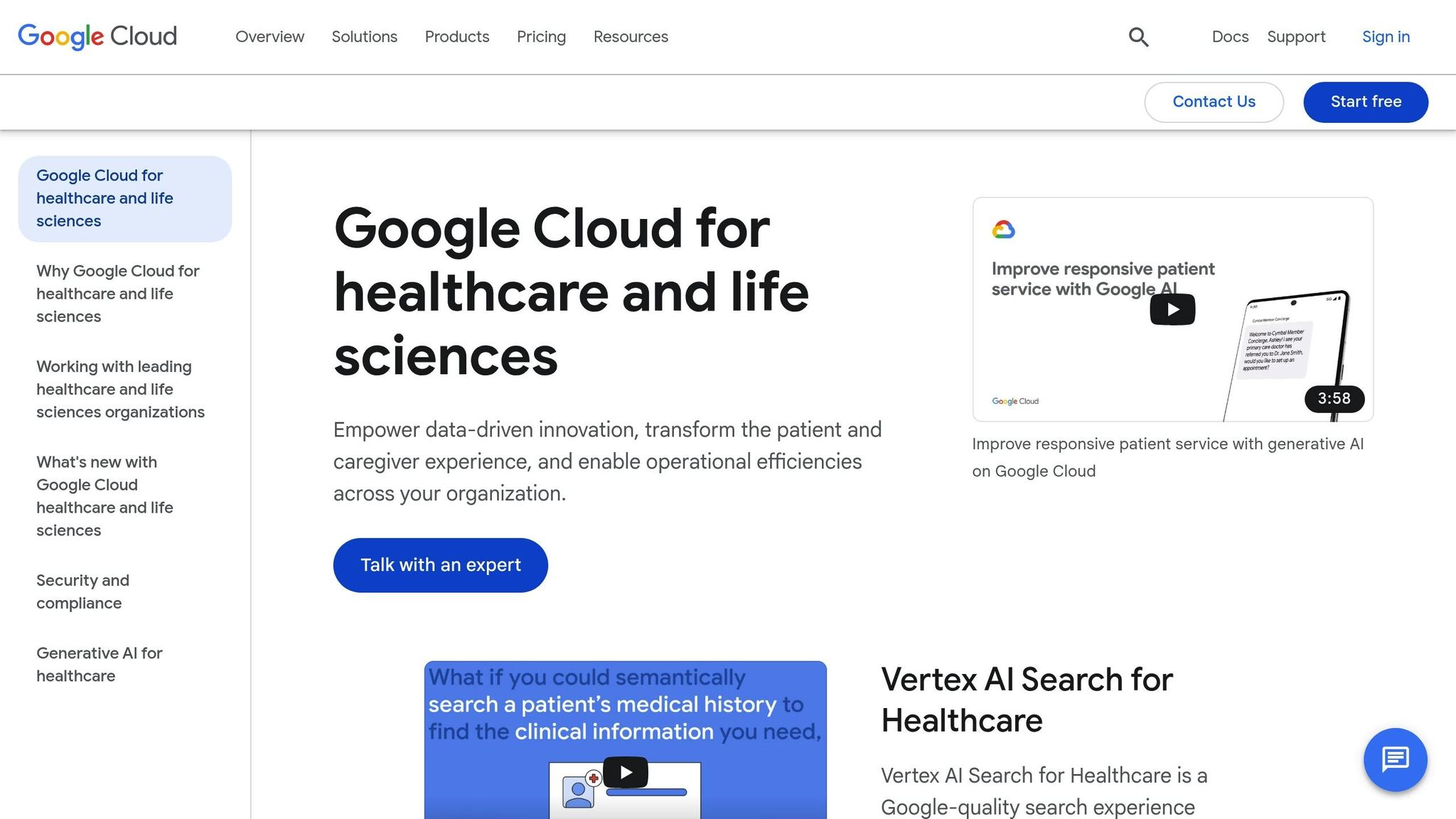
Google Cloud AI for Healthcare is a cloud-based platform designed to deliver advanced AI tools tailored for healthcare organizations. It operates on Google’s enterprise-level infrastructure and adheres to strict HIPAA compliance standards, ensuring sensitive patient data is handled securely.
HIPAA Compliance Mechanisms
Google Cloud AI for Healthcare meets HIPAA requirements by offering Business Associate Agreements (BAAs) and implementing stringent data controls. As Google explains:
"The Google products covered under the BAA meet the requirements under HIPAA and align with our ISO/IEC 27001, 27017, and 27018 certifications and SOC 2 report."
To maintain compliance, Google employs a dedicated privacy team and a top-tier internal audit team that monitors data traffic using automated reviews. This structured approach ensures healthcare organizations can trust the platform with their data security needs. On top of this, encryption strategies provide an additional layer of protection for patient information.
Data Security and Encryption Features
Google Cloud AI for Healthcare prioritizes data security through advanced encryption techniques. Data at rest is secured with AES-256 encryption, while data in transit is protected using BoringCrypto, a FIPS 140-2 validated encryption module. The platform also offers flexible key management options, including customer-managed encryption keys (CMEK), hardware-backed keys via Cloud HSM, and Cloud External Key Manager (EKM).
Other security measures include:
- Identity-Aware Proxy (IAP): Ensures secure user authentication.
- Two-Factor Authentication: Adds an extra layer of account protection.
- Cloud Data Loss Prevention (DLP): Helps identify and protect sensitive data.
- Healthcare De-identification (De-ID): Ensures patient privacy by anonymizing data.
Together, these features create a robust security framework for managing healthcare data.
Core Healthcare Functionality
The platform simplifies both administrative and clinical workflows by processing large volumes of unstructured data, such as medical documents and text records. For instance, Hackensack Meridian Health leveraged Google’s Gemini LLM to develop an AI-powered chat tool. This tool assists with tasks like summarizing meeting notes, drafting emails, preparing for conversations, and synthesizing research articles. By automating these tasks, healthcare staff can dedicate more time to patient care.
Interoperability with Healthcare Systems
Google Cloud AI for Healthcare enhances interoperability by standardizing diverse clinical data into a FHIR store. This allows for real-time care coordination and seamless data sharing. Highmark Health and Hartford HealthCare are two organizations that have successfully implemented this system.
Dr. Richard Clarke, Chief Analytics Officer at Highmark Health, highlights its impact:
"Google Cloud's Healthcare Data Engine solution helps create interoperability across Highmark Health and with outside organizations. This interoperability engine reduces as much friction as possible, so we're not asking providers to leave their workflow and go somewhere else. We're trying to introduce everything in a seamless way, so workflows will become easy for them to execute."
Similarly, Hartford HealthCare has embraced the platform to make patient data more accessible and actionable. Jeffrey A. Flaks, President and CEO of Hartford HealthCare, remarks:
"Creating world-class care requires world-class partners. We are exceptionally proud to stand with Google Cloud and work together to make seamless, personalized care a reality for patients. With Google Cloud's technology, Hartford HealthCare will adopt better digital solutions that make care accessible for all."
To further enhance compatibility across healthcare systems, Google Cloud collaborates with Redox. This partnership ensures data from any source is translated into a unified HL7® FHIR® format before ingestion, maintaining data integrity and compatibility across ecosystems.
3. Suki AI
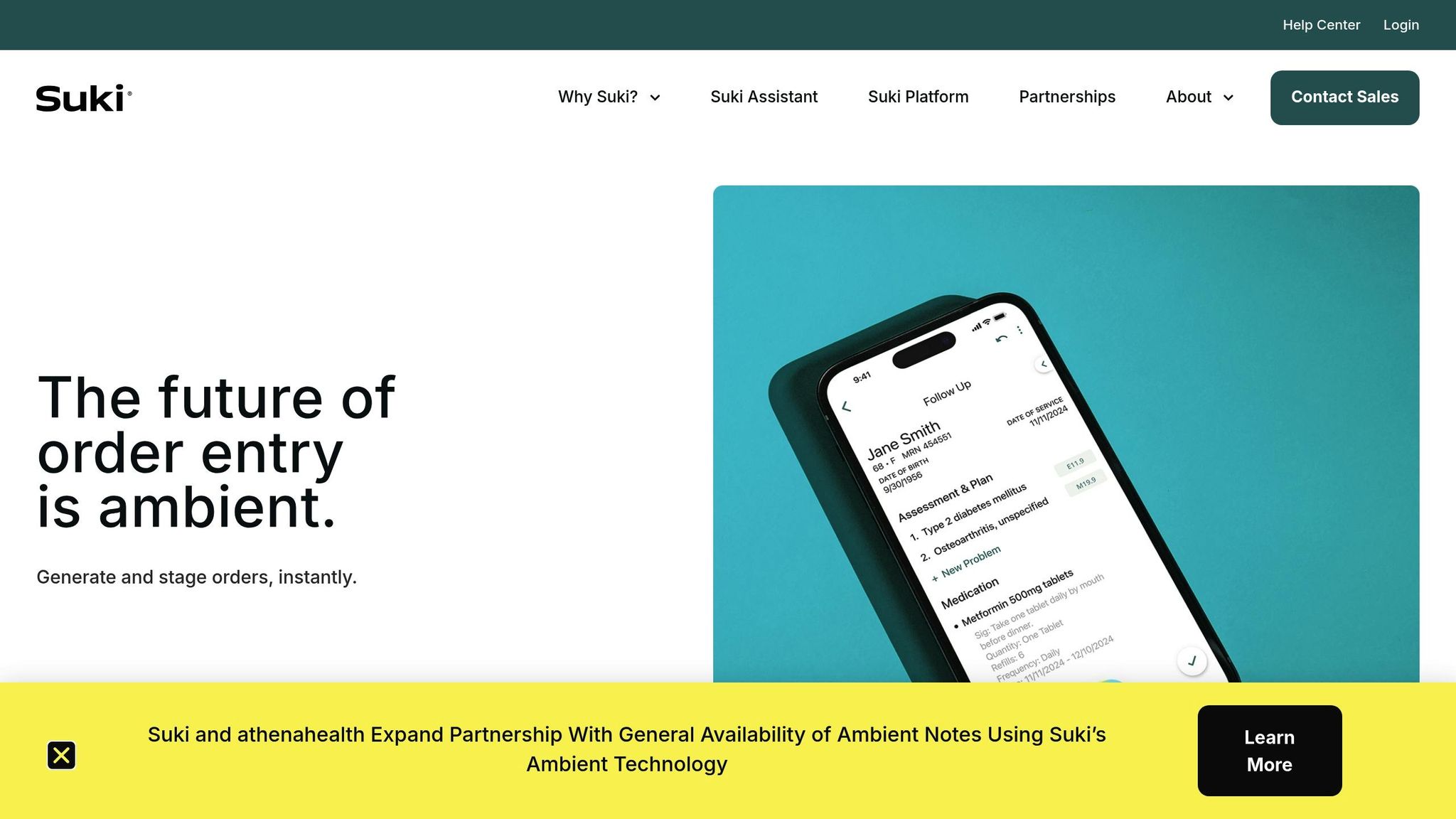
Suki AI is a clinical assistant powered by artificial intelligence, designed to simplify healthcare documentation and administrative tasks. It adheres to strict HIPAA compliance standards, offering features like ambient documentation, coding support, and clinical Q&A to help healthcare providers work more efficiently.
HIPAA Compliance Mechanisms
Suki AI is both SOC2 Type 2 certified and HIPAA compliant. Operating as a Business Associate under a Business Associate Agreement (BAA), it ensures that protected health information (PHI) is handled with the utmost care. The platform enforces rigorous safeguards to maintain data confidentiality, integrity, and availability, forming the backbone of its secure clinical operations.
Core Healthcare Functionality
Suki AI significantly reduces the time healthcare providers spend on documentation. With features like ambient documentation, dictation, ICD-10 and HCC coding, and the ability to answer medical queries, it enhances the efficiency of clinical workflows. According to Dr. Janelle Smith from Springfield, using Suki's Ambient Notes allowed her to complete nearly 90–100% of her notes on the same day, eliminating the need for weekend catch-up.
The platform also supports prescription generation and creates patient summaries by consolidating data from previous visits, medications, lab results, and problem lists. Dr. Kamel Sadek from VillageMD shares:
"The patient summary collects key patient information from prior visits and summarizes them so I don't have to dig through the EHR - I can now start conversations with more context which improves my connection with patients."
Suki's capabilities have led to adoption rates doubling in some cases, with providers typically seeing a return on investment by the second month.
Interoperability with Healthcare Systems
One of Suki AI's standout features is its integration with major electronic health record (EHR) systems like Epic, Oracle Cerner, and MEDITECH. This bidirectional integration allows clinicians to access real-time data directly within their workflow. Providers can pre-chart in the EHR and complete their documentation in Suki, minimizing manual data entry.
Dr. Bobby Dupre, CMIO at Our Lady of the Lake Regional Medical Center, highlights this seamless integration:
"With Suki ambient documentation, I can pull the pieces and parts from ambient as well as maintain the other pieces I use in Epic. The ambient generated content flows into Epic seamlessly into my note."
Suki's reliability also shines in challenging situations. For instance, Dr. Jeremy Screws from Hattiesburg Clinic shared that during an internet outage that disrupted EMR access, he continued working on notes in Suki and later transferred them into the system.
Suki is also expanding its reach beyond traditional EHR systems. Through a partnership with Zoom, Suki integrates AI-driven clinical notes into Zoom's Workplace for Clinicians. Punit Soni, Suki's CEO and founder, explains the vision behind this integration:
"By embedding Suki deeply into the EHR, we're delivering on the promise of ambient AI: less time on documentation, more time for care. This is what innovation should look like - seamless, intuitive, and focused entirely on the user experience."
4. Amazon Comprehend Medical
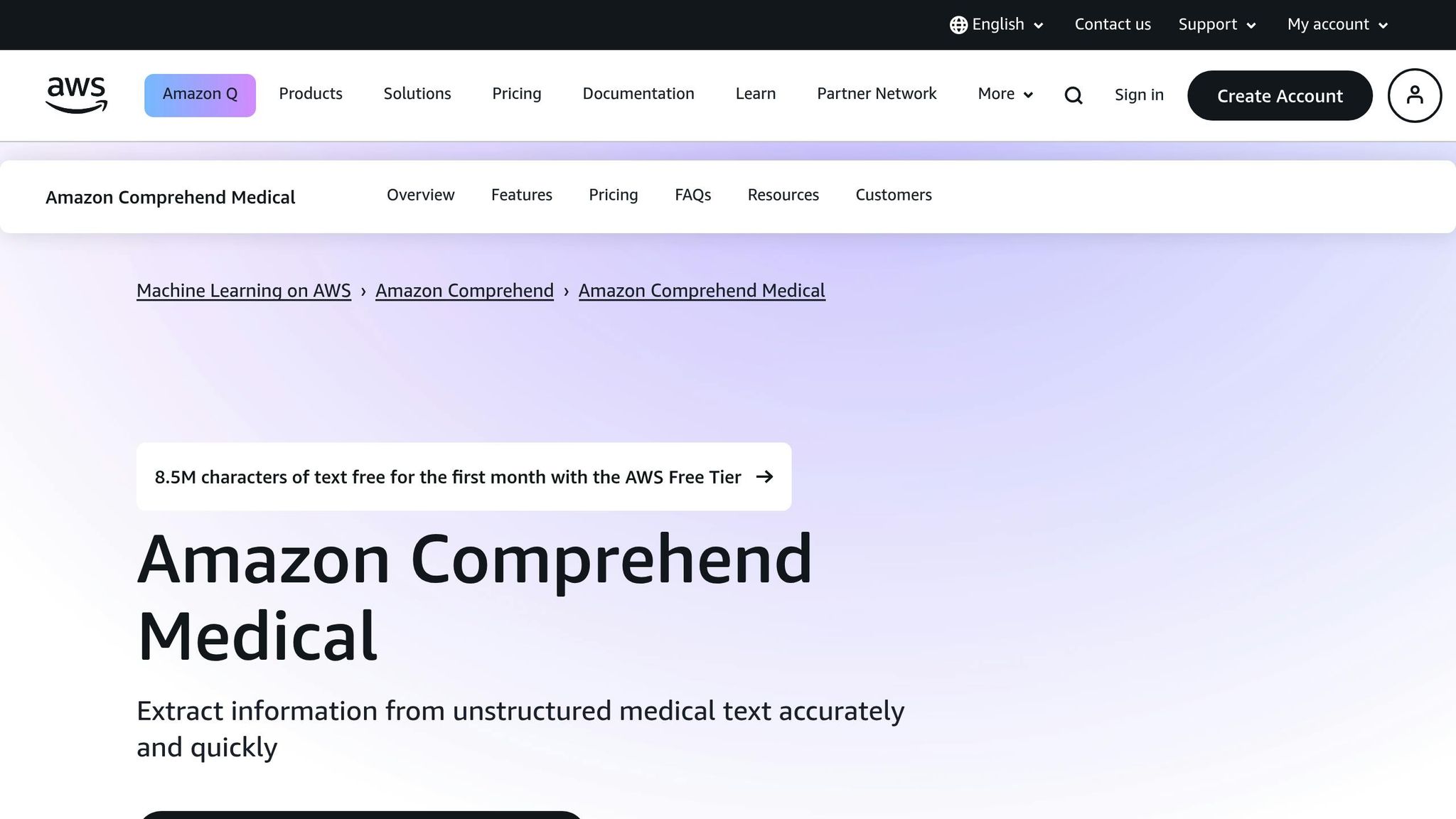
Amazon Comprehend Medical is a natural language processing (NLP) service designed to extract critical information from unstructured healthcare text. This HIPAA-eligible tool transforms clinical notes, radiology reports, and other medical documents into structured data while adhering to strict compliance standards for protected health information (PHI).
HIPAA Compliance Mechanisms
As a HIPAA-eligible service, Amazon Comprehend Medical includes measures to identify and secure PHI. It enforces HIPAA regulations through several safeguards, such as granular user access controls that ensure only authorized personnel can handle patient data. Additionally, the platform offers regional data storage options, enabling healthcare organizations to store data in specific AWS regions to comply with local privacy laws. Regular audits ensure adherence to industry standards like PCI DSS and FedRAMP. Importantly, the service does not use customer data to train its models, protecting sensitive healthcare information.
However, users should note that it may not always identify all PHI accurately and does not fully support HIPAA de-identification. This means healthcare organizations must carefully review outputs to ensure compliance with their unique requirements.
Core Healthcare Functionality
Amazon Comprehend Medical processes a variety of healthcare documents and extracts key details such as diagnoses, medications, procedures, and other PHI. These documents may include doctor’s notes, clinical trial reports, and radiology summaries. The service links extracted information to established medical ontologies like ICD-10-CM, RxNorm, and SNOMED CT, creating standardized data that integrates smoothly with existing healthcare systems.
A notable example of its impact is the Fred Hutchinson Cancer Research Center, which used this technology to streamline its clinical trial recruitment process. By leveraging Amazon Comprehend Medical, the time required to identify potential participants dropped from 9,600 hours to less than an hour. The service also supports tasks like automating insurance claim workflows and analyzing population health data to identify care gaps and improve hospital operations.
Data Security and Encryption Features
Amazon Comprehend Medical builds on its compliance foundation with robust data security measures. It uses SSL/TLS protocols for secure data transmission and AWS Key Management Service (KMS) for encryption, allowing organizations to manage their own encryption keys. Input documents are also encrypted through Amazon S3 integration, ensuring that sensitive healthcare data remains secure throughout the entire processing workflow.
Interoperability with Healthcare Systems
The service is designed to enhance interoperability across healthcare systems by supporting the FHIR standard, which enables seamless data exchange between platforms. It processes clinical notes from diverse sources, such as Electronic Health Records (EHRs), lab systems, radiology reports, voice notes, and scanned documents. Amazon Comprehend Medical supports both HL7 V2 messages and FHIR documents, automatically converting unstructured text into structured formats like Parquet for analytics and machine learning.
Organizations can integrate this service into serverless architectures using AWS tools like S3, SQS, Lambda, and Step Functions for scalable processing. Research published in Nature demonstrated its analytical strength, showing that disease trajectory models built from unstructured EHR text were able to predict 80% of adverse patient events ahead of time.
sbb-itb-bec6a7e
5. Microsoft Azure Healthcare APIs
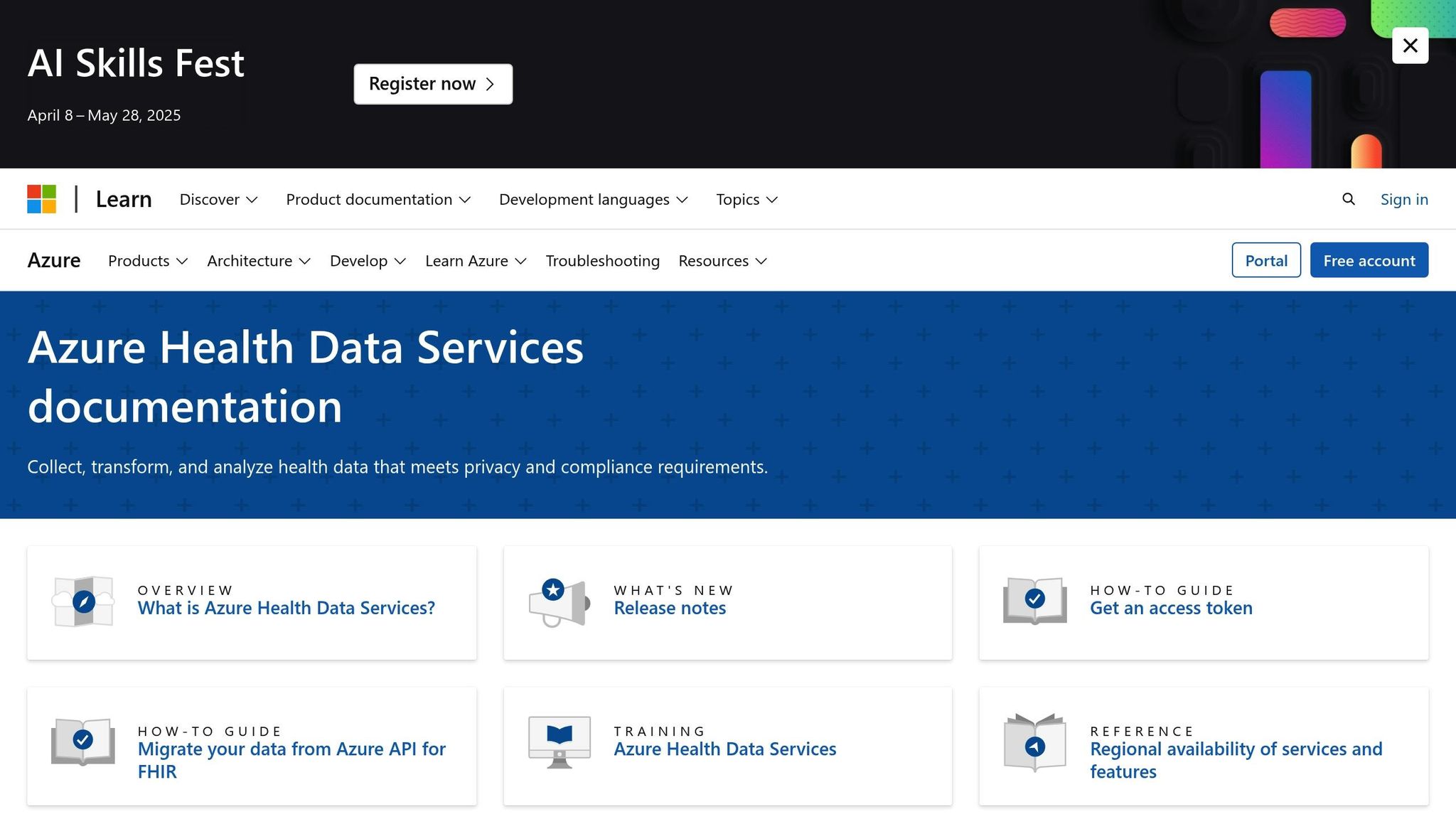
Azure Health Data Services is a cloud platform designed to handle Protected Health Information (PHI) with strict adherence to healthcare standards like FHIR and DICOM. It provides FHIR, DICOM, and MedTech services, enabling healthcare organizations to manage and utilize their data efficiently.
HIPAA Compliance Mechanisms
Azure Health Data Services is certified under the HITRUST CSF framework, helping healthcare organizations meet HIPAA and GDPR requirements while aligning with ONC and CMS mandates. Microsoft also provides Business Associate Agreements (BAAs) for covered entities, ensuring compliance with regulations around data protection, breach notifications, and access control.
The platform integrates Azure Policy initiatives that align with HIPAA and HITRUST compliance domains, offering built-in support for regulatory adherence. Access controls are enforced through application monitoring and role-based permissions, with authentication powered by Microsoft Entra ID and OAuth 2.0. Microsoft’s investment of over $1 billion annually in cybersecurity and its team of 3,500+ security experts further bolster the platform's compliance and security capabilities.
Core Healthcare Functionality
Azure Health Data Services is built to unify and standardize diverse health data, making it easier to work with clinical, imaging, device, and unstructured datasets. It integrates seamlessly with tools like Azure Synapse Analytics, Azure Machine Learning, and Power BI, enabling healthcare providers to derive insights from real-world data. These insights are invaluable for clinical research, including cohort creation for trials.
The MedTech service processes biometric data from devices, converting it into FHIR format to support remote patient monitoring. Meanwhile, the DICOM service simplifies workflows in radiology and pathology by handling DICOM file storage, management, and exchange.
"ZEISS is able to connect our medical technology to Microsoft's cloud enabling improved clinical workflows in a secure environment."
- Euan S. Thomson, PhD, President, Ophthalmic Devices and Head of Digital Business, ZEISS Medical Technology
Azure Health Data Services operates on a pay-as-you-go pricing model, with structured storage starting at $0.39 per GB/month and API requests priced at $0.54 per 100,000 requests after the first 50,000.
Data Security and Encryption Features
Microsoft ensures data security by encrypting all information by default, using Microsoft-managed keys. Both imaging and device data are secured according to Microsoft’s rigorous standards. Role-Based Access Control (RBAC) further limits access to sensitive patient information, ensuring only authorized users can interact with the data.
Interoperability with Healthcare Systems
Azure’s FHIR service enables seamless integration with any health data system or application capable of sending FHIR API requests. This feature allows electronic health records (EHRs) to connect with Azure’s analytics and machine learning tools, ensuring a smooth exchange of standardized data.
Azure’s interoperability has already proven effective in real-world applications. For instance, Sensoria Health used the Azure API for FHIR to power its clinician remote monitoring software. Dr. David Armstrong, Cofounder of Southwestern Academic Limb, highlighted its impact:
"Without the Azure API for FHIR that Sensoria Health used for the clinician remote monitoring software, we'd be fighting diabetic foot disease with one arm tied behind our backs".
Similarly, MultiCare Connected Care is leveraging Azure to expand its pilot project across multiple partners. The platform’s secure interoperability aligns seamlessly with the broader ecosystem of AI tools, offering a scalable solution for modern healthcare needs.
6. IBM Watson Health
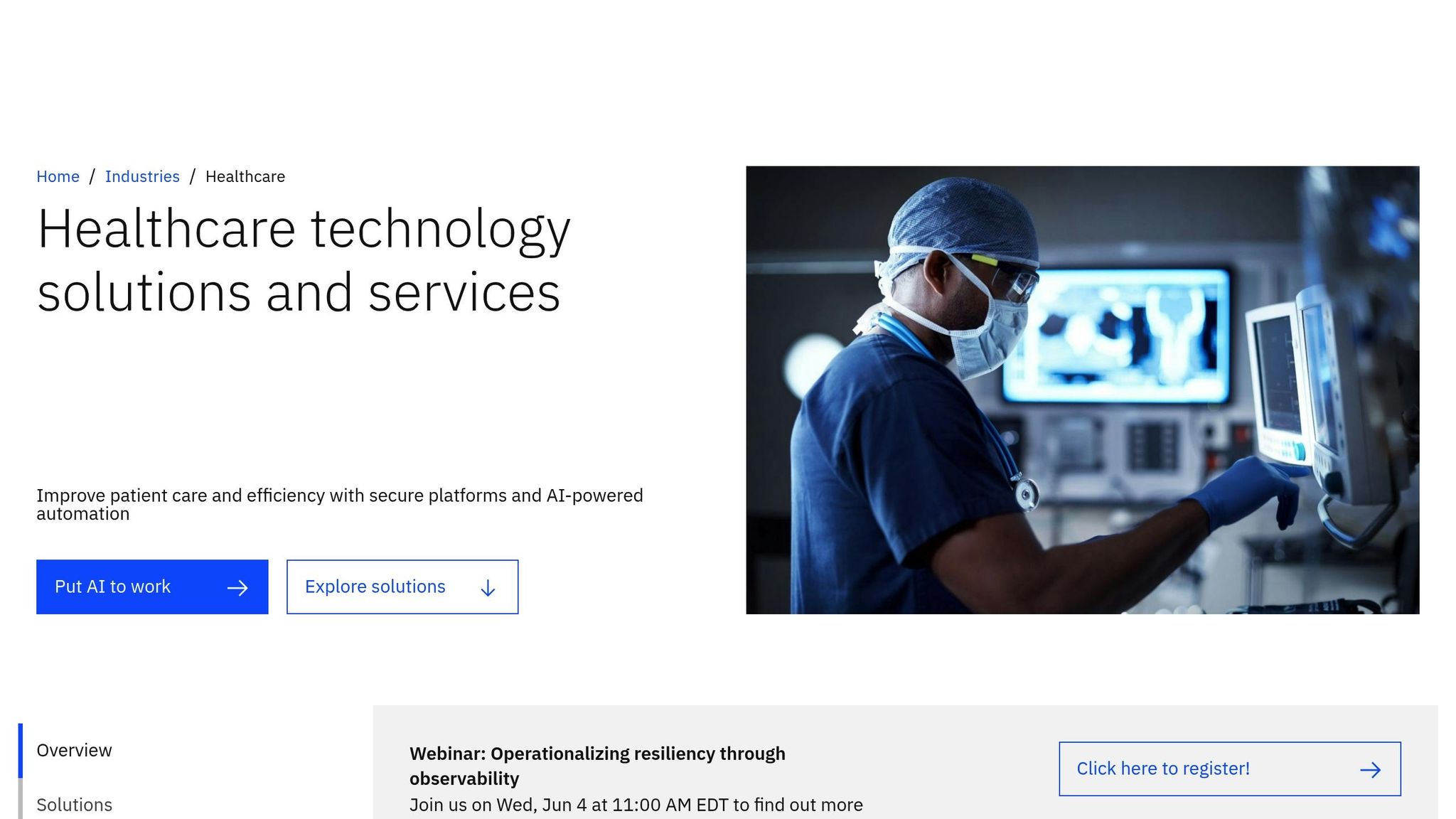
IBM Watson Health continues to advance HIPAA-compliant AI tools, offering solutions tailored for the healthcare industry. By combining machine learning with robust security frameworks, the platform helps healthcare providers analyze medical data while safeguarding patient privacy. It seamlessly integrates cognitive computing into clinical workflows, building on the legacy of HIPAA-compliant AI technologies.
HIPAA Compliance Mechanisms
IBM Watson Health adheres to the Security and Privacy Rules outlined in HIPAA, ensuring compliance through administrative, physical, and technical safeguards required for Business Associates under 45 CFR Part 160 and Subparts A and C of Part 164. Healthcare organizations activate HIPAA compliance by signing IBM's Business Associate Addendum (BAA), which clearly defines the responsibilities of both parties in maintaining compliance. Once enabled on an IBM Cloud account, HIPAA compliance remains active to protect sensitive patient information, or protected health information (PHI).
The platform provides HIPAA-ready configurations tailored to specific plans and locations. For example, watsonx Assistant offers HIPAA support for Enterprise plans hosted in Washington, DC, or Dallas. Cloud Pak for Data as a Service enables machine learning capabilities with HIPAA-compliant settings, while watsonx.ai Studio and Runtime offer HIPAA-ready configurations for Professional and Standard plans, respectively.
Core Healthcare Functionality
IBM Watson Health enhances electronic health record (EHR) systems by embedding AI-driven insights directly into clinical workflows. A notable example is Peninsula Regional Medical Center's integration of a Watson AI-powered clinical decision support tool into its Epic EHR system in April 2020. Through a dedicated MedHelp tab, clinicians could use natural language queries to access contextual, evidence-based medication information. In the first month, the tool was accessed 489 times, with 92% of users expressing a strong likelihood of continued use due to its seamless functionality. Additionally, information retrieval times dropped to under a minute, significantly improving efficiency.
The platform also incorporates advanced AI tools like watsonx Governance for model tracking, data lineage management, and risk assessment. It includes PII extraction capabilities, enabling it to support compliance with GDPR alongside HIPAA.
Data Security and Encryption Features
To protect PHI, IBM Watson Health employs a zero trust security model. This approach assumes potential breaches and relies on multi-layer verification, access controls, identity management systems, and contextual analysis to secure data. By implementing this dynamic cybersecurity framework, healthcare organizations can respond effectively to threats while maintaining rigorous security standards. These measures also facilitate secure data exchange across systems without compromising protection.
Interoperability with Healthcare Systems
IBM Watson Health excels in integrating with existing healthcare infrastructure, particularly EHR systems. Its interoperability capabilities allow institutions to harness cognitive computing to analyze medical records securely via cloud-based Watson services. For example, Epic customers exchanged over 80 million medical records in the past year, illustrating the platform's ability to manage healthcare data at scale.
IBM executives have highlighted its potential, stating:
"Interoperability with Watson will enable these institutions to apply the cognitive capabilities of Watson to these records through secure, cloud-based Watson services, providing greater clinical insight to help personalize healthcare."
Beyond data exchange, Watson Health’s interoperability features include HIPAA-compliant cloud infrastructure with encryption, granular access controls, and real-time monitoring. These tools ensure healthcare data remains secure while enabling advanced analytics to improve patient outcomes.
7. DeepScribe
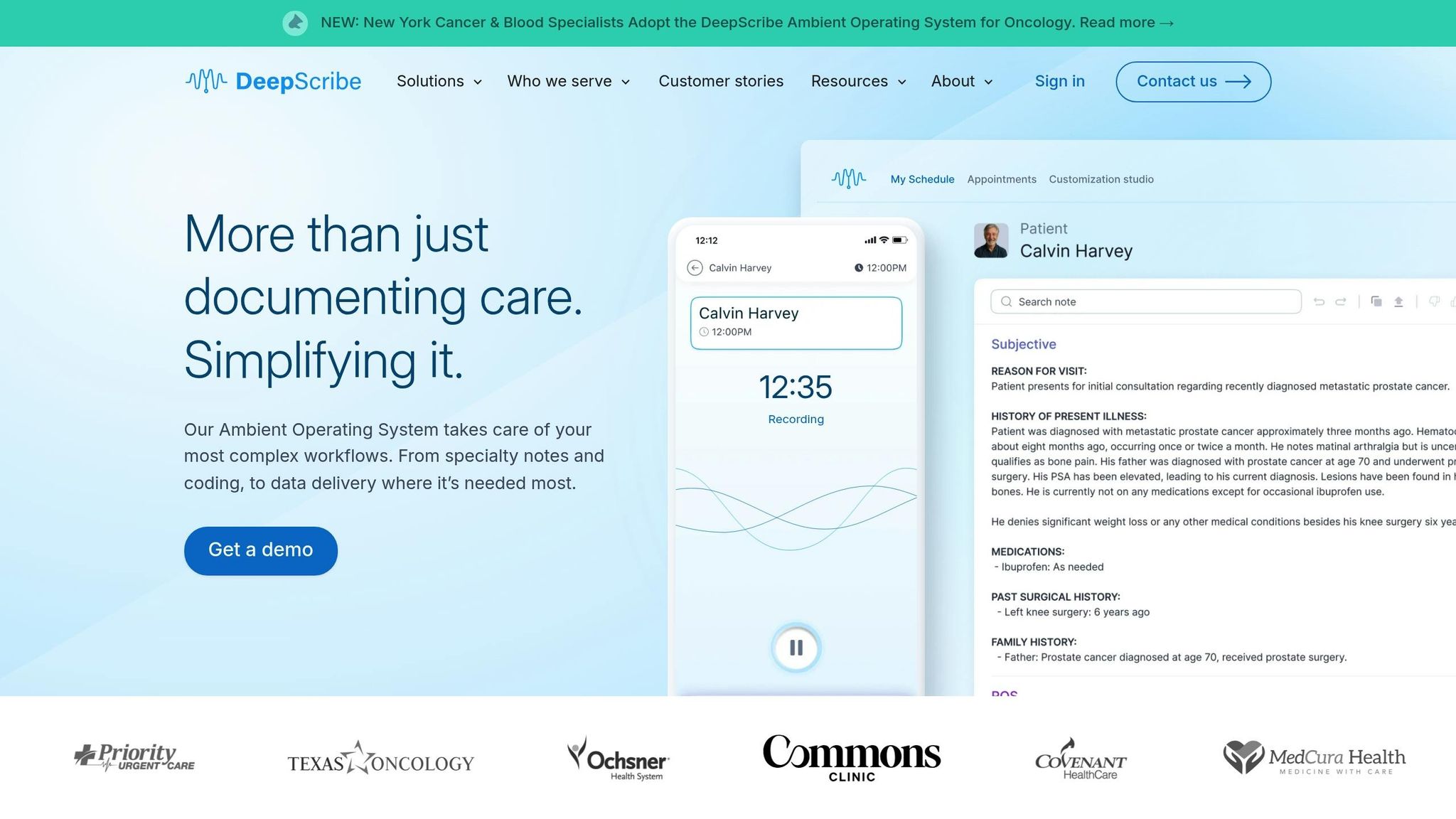
DeepScribe focuses on turning patient–clinician conversations into structured medical documentation, all while adhering to strict HIPAA guidelines. Using advanced speech recognition and natural language processing (NLP), it transforms real-time conversations into detailed, structured records. This helps healthcare providers tackle the often overwhelming task of clinical documentation.
HIPAA Compliance Mechanisms
DeepScribe takes a thorough approach to HIPAA compliance, starting with mandatory HIPAA certification for all its employees. The platform operates under a formal Business Associate Agreement (BAA), ensuring that healthcare organizations can confidently evaluate its compliance measures. Providers are encouraged to review and sign the BAA, along with the Terms of Service and Privacy Policy, to ensure their chosen DeepScribe plan aligns with HIPAA requirements. These measures form the backbone of DeepScribe's clinical documentation capabilities.
Core Healthcare Functionality
DeepScribe is designed to ease the documentation workload for healthcare providers by offering more than just transcription. Trained on over 5 million labeled patient conversations, its accuracy surpasses GPT-4 by 59%. With an 80% clinician adoption rate, it provides AI coding for E/M, HCC, and ICD-10, while enabling context-aware documentation during patient visits. Additional features include automated post-visit EHR ordering, patient visit summaries, and pre-charting with HCC code insights.
The platform's real-world impact is evident. For instance, Covenant HealthCare reduced after-hours EHR documentation by up to 75%. Frank Fear, CIO at Covenant HealthCare, highlighted its benefits:
"DeepScribe is empowering us to alleviate the documentation burden, deliver exceptional patient care, and make good on our promise to prioritize clinician well-being".
DeepScribe also offers a Customization Studio, allowing providers to tailor note formatting, wording, and layout to match their specific workflows. It can automatically adjust clinical notes based on visit types and enhance features like the Plan by Problem, complete with ICD-10 billing codes, to meet individual practice needs.
Data Security and Encryption Features
To safeguard patient data, DeepScribe employs end-to-end AES-256 encryption for all information. This ensures data protection both during transmission and while stored. Personal identifiers are stripped from encrypted data, adding an extra layer of security. Access is tightly controlled through multi-factor authentication, strict permission settings, and Single Sign-On (SSO) integration, ensuring that only authorized personnel can access protected health information (PHI). Regular audits, risk assessments, and a defined incident response plan further strengthen its security framework.
Interoperability with Healthcare Systems
DeepScribe integrates seamlessly with leading EHR systems, offering bi-directional data exchange that allows AI-generated notes to sync directly into the appropriate fields. It works with major providers like Epic, athenahealth, NextGen Healthcare, Veradigm, Allscripts, and eClinicalWorks. This deep integration enables healthcare organizations to implement specialty-specific workflows. Jason Hill, MD, Innovation Officer at Ochsner Health, shared:
"DeepScribe's Customization Studio and deep Epic integration have allowed us to deploy ambient AI with specialty-specific workflows that accommodate physician preferences".
The platform is particularly effective in oncology, supporting pre-charting, context-aware notes, automated interval histories, and direct integration with OncoEMR and iKnowMed systems.
Feature Comparison Table
Each HIPAA-compliant AI tool brings its own set of strengths to the table. To choose the right one, it’s essential to weigh their AI capabilities, compliance features, certifications, and pricing models. Below is a detailed comparison of these tools to help you make an informed decision.
| Tool | Primary AI Capabilities | HIPAA Compliance Features | Key Certifications | Pricing Model | Best For |
|---|---|---|---|---|---|
| Hathr.AI | Natural language processing, document analysis, conversational AI | AWS GovCloud hosting, end-to-end encryption, no data reuse | HIPAA Compliant, NIST 800-171 certified | $45/month | Teams handling PHI/PII data |
| Google Cloud AI for Healthcare | Machine learning, medical imaging analysis, predictive analytics | Healthcare API security, BAA available, encrypted data storage | HIPAA compliant infrastructure | Pay-per-use | Large-scale data analytics |
| Suki AI | Voice recognition, clinical documentation, NLP | Real-time transcription encryption, secure cloud storage | HIPAA compliant, BAA provided | Subscription-based | Voice-driven documentation |
| Amazon Comprehend Medical | Medical text analysis, entity extraction, relationship mapping | AWS security controls, encrypted processing | HIPAA eligible services | Pay-per-request | Medical text processing |
| Microsoft Azure Healthcare APIs | FHIR data processing, interoperability, analytics | Azure security framework, compliance monitoring | HIPAA compliant, SOC 2 Type II | Usage-based pricing | Healthcare data integration |
| IBM Watson Health | Predictive analytics, clinical decision support, data analysis | Enterprise-grade security, audit controls | HIPAA compliant infrastructure | Enterprise licensing | Clinical decision support |
| DeepScribe | Speech recognition, NLP, automated documentation | AES-256 encryption, multi-factor authentication, SSO | BAA available, HIPAA compliant | Subscription tiers | Clinical documentation |
Each tool has its niche. For example, Hathr.AI emphasizes high-security environments with AWS GovCloud and NIST 800-171 certifications, while DeepScribe focuses on securing clinical documentation with features like AES-256 encryption. Meanwhile, major platforms like Google Cloud AI for Healthcare and IBM Watson Health offer robust solutions for predictive analytics and large-scale data processing.
When it comes to functionality, Suki AI and DeepScribe excel in clinical documentation, while Amazon Comprehend Medical specializes in analyzing unstructured medical text, extracting key entities, and mapping relationships. If your organization needs interoperability and FHIR data processing, Microsoft Azure Healthcare APIs might be the best fit.
Pricing models differ significantly. Hathr.AI charges a flat $45 per month, making it an affordable option for smaller teams. In contrast, tools like Google Cloud AI and Amazon Comprehend Medical follow a pay-as-you-go approach, while enterprise solutions like IBM Watson Health require custom licensing agreements.
Integration capabilities also play a critical role. For instance, DeepScribe integrates seamlessly with major EHR systems like Epic and athenahealth, simplifying workflows. On the other hand, Microsoft Azure Healthcare APIs leverage FHIR standards to ensure smooth connectivity across healthcare systems, which can impact both implementation and long-term efficiency.
Studies suggest these AI tools can significantly enhance diagnostic accuracy and streamline operations. In fact, strategic use of AI in healthcare could result in annual savings ranging from $200 billion to $360 billion.
Ultimately, your choice should align with your organization's priorities. If secure document processing is your focus, Hathr.AI might be ideal. For large-scale predictive analytics, consider IBM Watson Health or Google Cloud AI. Matching the tool’s features with your compliance needs and integration requirements is key to maximizing its potential.
Conclusion
HIPAA-compliant AI tools are transforming healthcare by improving patient care and streamlining operations - all while keeping patient data secure. These tools not only enhance efficiency but also help reduce critical risks tied to data breaches and compliance violations.
To put things into perspective, HIPAA enforcement actions in 2023 exceeded $38 million. The average cost of a data breach reached $165 per record, with total breaches averaging $9.8 million per incident. A stark example of these risks unfolded in early 2024 when the ALPHV/Blackcat group targeted Change Healthcare with a ransomware attack. This incident disrupted hospitals and pharmacies nationwide, leading to a staggering financial impact of $872 million.
But beyond mitigating risks, these tools offer practical solutions for operational challenges. For instance, they can help address staffing shortages by ensuring reliable, around-the-clock communication. Whether you’re leveraging Hathr.AI for secure data processing or DeepScribe for automated documentation, choosing the right tool is essential.
The key to success lies in selecting AI solutions that align with your current compliance framework and technical infrastructure. This includes crafting clear AI policies, ensuring third-party contracts address AI-specific risks, and implementing robust security measures like encryption and access controls.
The seven tools highlighted in this guide provide actionable options for compliant AI adoption. By aligning your specific needs - whether in documentation, analytics, or text processing - with the right HIPAA-compliant tool, you can embrace AI's potential while safeguarding patient trust. The real challenge isn’t deciding whether to adopt AI, but how to do so responsibly and effectively. With the right tools, healthcare organizations can drive secure, meaningful innovation.
FAQs
How do HIPAA-compliant AI tools protect patient data in healthcare?
HIPAA-compliant AI tools are designed to keep patient data secure by employing robust security measures. For instance, they use end-to-end encryption to safeguard data both during transmission and while it’s stored. They also utilize data anonymization, which strips away personally identifiable information (PII) to uphold patient privacy.
These tools go further by aligning with HIPAA's Privacy and Security Rules. They enforce role-based access controls, ensuring that only authorized personnel can access sensitive information. Additionally, they maintain automated audit trails, which track and monitor how data is used. By focusing on these protections, HIPAA-compliant AI tools not only help healthcare providers meet regulatory requirements but also build trust while integrating AI into their operations.
What should healthcare organizations look for in a HIPAA-compliant AI tool?
When selecting an AI tool that complies with HIPAA regulations, healthcare organizations need to focus on data security and regulatory compliance. The tool should include robust protections such as end-to-end encryption, role-based access controls, and automated audit trails. These measures are essential to safeguard sensitive patient data and ensure that information remains secure.
Equally important is ensuring the tool adheres to HIPAA's Privacy and Security Rules. This means that Protected Health Information (PHI) must be accessed and used only when absolutely necessary, following strict guidelines.
Another key consideration is verifying that the AI vendor offers a Business Associate Agreement (BAA). This agreement is crucial as it defines the vendor's obligations for managing and securing PHI. By prioritizing these elements, healthcare organizations can confidently integrate AI into their operations while maintaining compliance and protecting patient data.
How do HIPAA-compliant AI tools work with EHR systems to improve healthcare operations?
HIPAA-compliant AI tools work effortlessly with Electronic Health Record (EHR) systems to simplify healthcare processes and lighten the administrative load. These tools can take over time-consuming tasks like drafting patient responses, summarizing clinical notes, and transforming unstructured data into organized SOAP notes. The result? Healthcare providers can dedicate more attention to their patients.
Many of these AI solutions also feature real-time dictation and automated clinical documentation, which not only enhance the accuracy of patient records but also help reduce the workload for clinicians. By optimizing workflows while adhering to HIPAA regulations, these tools enable healthcare organizations to operate more efficiently and provide better care for their patients.


